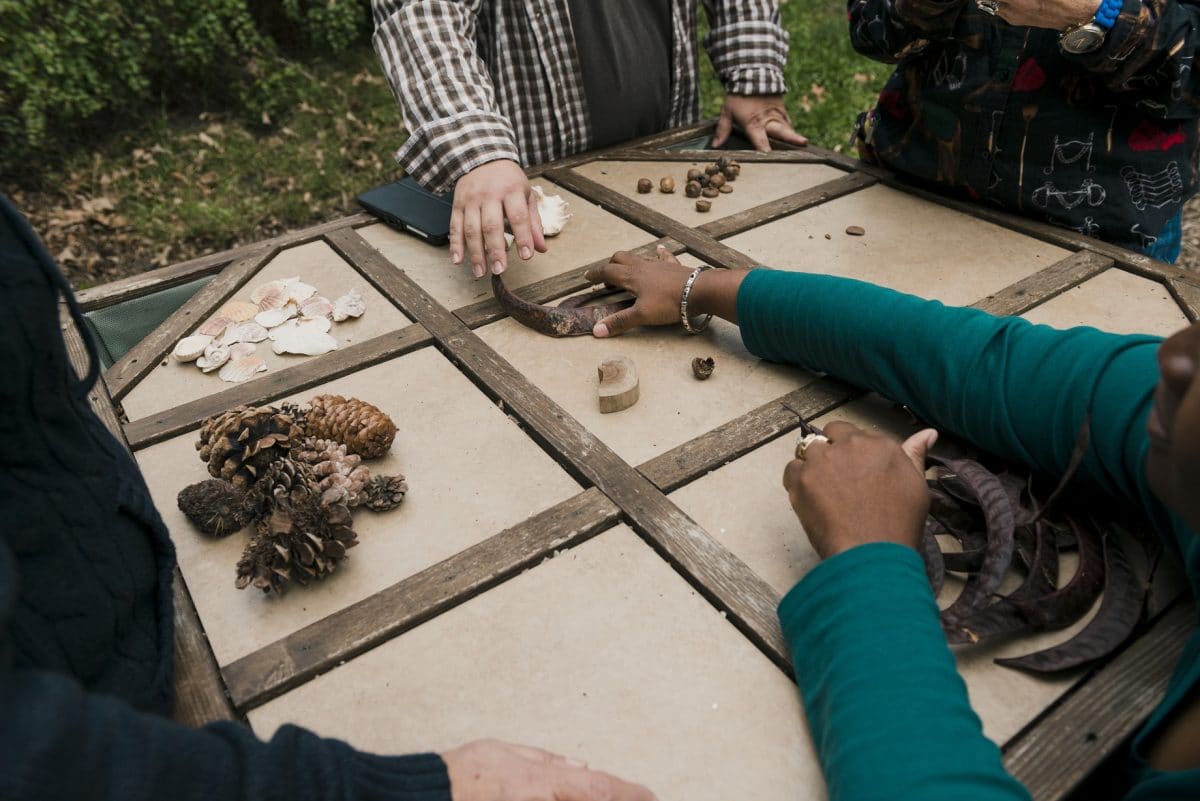The Generation Whisperer

Chris Whitmire calls herself “old-school,” and thinks in terms of generations. Although her childhood was infused with nature, she thinks the “ideal” time to have been born was in the 1950s, half a generation before her own birth. She believes those to have been the golden years for children connecting with nature. Rural and suburban children in the ‘50s were comfortable with nature. They often spent as many hours in uninterrupted free play as today’s children spend indoors involved in “screen time.” Yet Chris still had lots of outdoor time as a child. And her love of nature informs both the environment she has created for our youngest generation, and the professional education she provides to all the generations in between.
Chris made sure that the school for young children she planned and started five years ago had a Nature Explore Classroom. The Early Learning Center at Granger Community Church in Granger, Indiana now provides educational experiences that are inspirational to many. For example, Chris and her school were one of the influences on the Indiana Association for the Education of Young Children’s decision to recommend outdoor classrooms as a statewide example of excellence in early childhood practice.
Chris also inspires new understandings of nature’s importance to children through workshops she and a colleague, Dr. Carla Gull, have designed for education professionals. Although they may be conducted in the Nature Explore Classroom, and incorporate some of our information, these educational experiences are unique to Chris and Carla. In these workshops, Chris’ intergenerational awareness plays a crucial role. We can learn from her experience in our own work in drawing people of all ages closer together in nature.
Our society’s relationship with nature has become increasingly fragile over the years. We have seen that each generation since the ‘60s has withdrawn their children further from unstructured, uninterrupted play outdoors. As Richard Louv documents in “Last Child in the Woods,” reasons for the decrease in children’s time outdoors have shifted, and grown in influence. Initially, over-scheduling of children’s days reduced the availability of hours free for outdoor play. Later, fears that became symbolized as “stranger danger” came into play. And after a generation of reduced time outdoors, children and their parents simply grew less experientially familiar with the nature around them, and less comfortable in it. Finally, the advent of screen time, from video gaming to time spent on social media, proved a further lure to the indoor environment.
As we have heard from many of the older mentors in Nature Explore Classroom environments, younger teachers sometimes have little direct experience in nature themselves. Many simply did not get the extended periods of free play outdoors that was common in previous generations. Their eagerness to assist children in the outdoor classroom isn’t informed by their own childhood experience. Aware of this, Chris has crafted her professional education presentations and workshops to address the varying relationships (or non-relationship) of each person attending. These gaps between intention, expertise and comfort level are filled by the pedagogy of Chris’ workshops.
Dr. Carla Gull, her co-developer and co-presenter, has expertise in instructional leadership and outdoor education. Chris contributes her own love of nature and expertise in early childhood education, innovation and leadership. Together, Chris and Carla have found a way to empower educators from the Baby Boom generation (born from 1946-64), through Gen Xers (1965-80), Gen Yers (the “Millennials” born between 1980-95), and Generation Z (1995-2005), which has had no life experience before the internet.
Partially because she feels a kinship with the Baby Boomers, Chris sees herself as an “interpreter” between generations in terms of cultural understandings about nature. Of course some educators attending the workshops have had a nature-rich upbringing, and are comfortable with being outdoors. Others, due to having had a very schedule-driven childhood might simply not have had much time playing outdoors as a child. Some might be hesitant to engage directly with children bringing them worms and bugs. Chris and Carla know that all these educators want to effectively facilitate children’s engagement with nature. Bridging generational and personal perspectives, honoring each person’s starting-point, and allowing each person to find her/his way into a comfort zone, is the goal.
Two questions Chris and Carla ask at the workshops beautifully set the stage for what follows. The first, “How natural is your current play environment for children outdoors?” (The range of response is from “concrete city” to “forest preschool.”) The second, “How comfortable are you in a natural environment?” (The range of response is from “no way” to “wild-child.”) Through the responses, Chris and Carla know how to adjust the workshop activities to the varieties of experiences of their attendees.
Some education professionals in the workshops have little to no experience with nature-based learning. “It’s up to those of us who have the experience and believe in nature education, to think about ways that we can connect them more deeply with the natural environment that they initially didn’t know. It’s an introduction to a new way of thinking,” says Chris. An initial goal is, “to work with them to acknowledge where they are, and respect where they are.” Yet Chris knows that, “to understand the benefits [of nature-based education… their hearts have to be involved—not just their head. They have to understand why they would want to do this for children, and why it helps them have a happier and better life.”
For educators who themselves had been raised without much time outdoors, or with a fear of the outdoors, this can be a sensitive transition. Here is one area where Chris’ skills as an “interpreter” between generations deeply inform her approaches. “If they truly care about children they will be able to work through some of their past,” she says. This is far more than providing an educational experience based on meeting a person at their starting-point. This reflects an understanding that generational differences can be profound. This involves knowing that different cultural and individual experiences can be deep barriers to being fully present with children in a natural environment, and that issues from the past need working-through. The shared goal of service to children is the motivator that crosses the boundaries between generations. Chris and Carla are guides on the journey.
We’ll revisit Chris at her school in the next blog post, but leave off here in describing her workshops. Important to absorb is the basis of understanding and compassion that inform her “intergenerational interpreter” skills. The many activities children experience in Nature Explore Classrooms are foundational to later learning. Chris’ activities with education professionals during workshops are foundational to their later embracing learning in nature. This Baby Boomer learned much by talking with Chris, and what I learned will inform my writing going forward.

